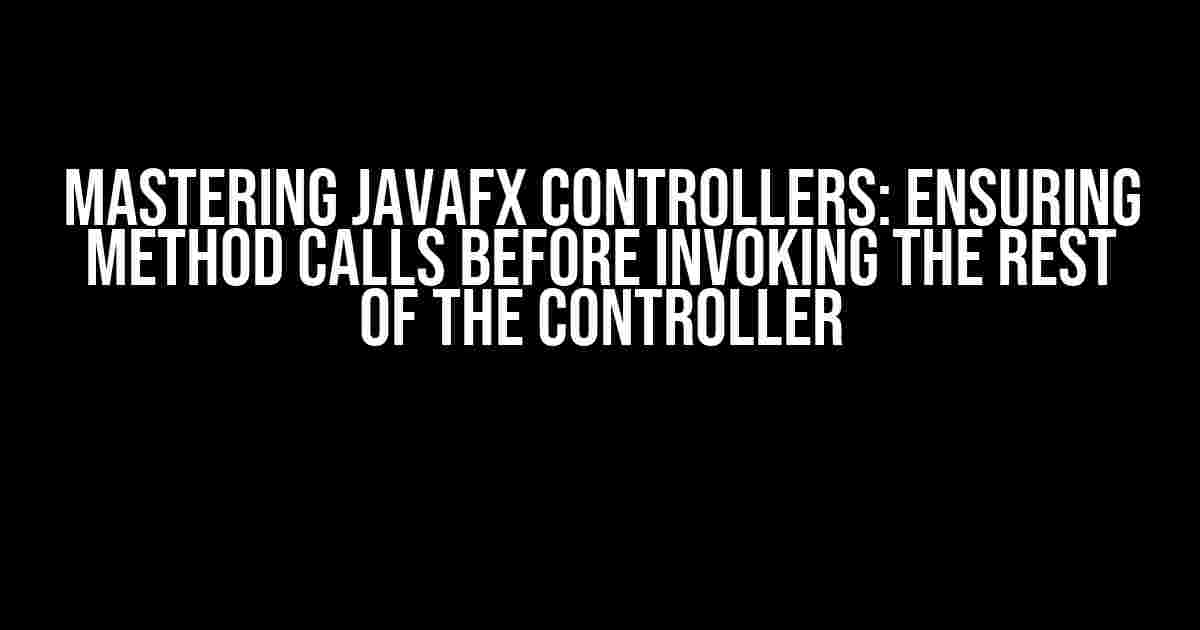- Introduction
- Understanding JavaFX Controllers
- The Problem: Ensuring Method Calls Before Invoking the Rest of the Controller
- Solution 1: Using the `initialize()` Method
- Solution 2: Using a Separate Initialization Method
- Solution 3: Using a Singleton Pattern
- Best Practices and Considerations
- Conclusion
- FAQs
Introduction
JavaFX, the popular Java-based GUI framework, relies heavily on controllers to manage the interactions between the user interface and the application’s logic. In this article, we’ll delve into the world of JavaFX controllers and explore how to ensure that a method is called before invoking the rest of the controller, a crucial aspect of building robust and efficient GUI applications.
Understanding JavaFX Controllers
A JavaFX controller is a Java class that acts as an intermediary between the GUI components and the application’s business logic. It receives input from the GUI, processes the data, and updates the GUI accordingly. Controllers are typically annotated with the `@FXML` annotation, which indicates that the class is a JavaFX controller.
@FXML
public class MyController {
// Controller logic goes here
}
The Problem: Ensuring Method Calls Before Invoking the Rest of the Controller
When building a JavaFX application, it’s essential to ensure that certain methods are called before the rest of the controller is invoked. This is particularly important when dealing with dependencies, such as loading data from a database or initializing complex GUI components.
The question is, how do you ensure that a method is called before the rest of the controller is invoked? One approach is to use the `@FXML` annotation on the method itself, but this has its limitations. In this article, we’ll explore alternative solutions that provide more flexibility and control.
Solution 1: Using the `initialize()` Method
The `initialize()` method is a special method in JavaFX controllers that’s called after the controller has been created and the `@FXML` annotated fields have been injected. This method is an ideal place to perform any necessary setup or initialization before the rest of the controller is invoked.
@FXML
public class MyController {
@FXML
private Label label;
@Override
public void initialize(URL location, ResourceBundle resources) {
// Perform initialization tasks here
label.setText("Initialized!");
}
}
In this example, the `initialize()` method is used to set the text of a label to “Initialized!”. This method is called automatically by JavaFX after the controller has been created and the `@FXML` annotated fields have been injected.
Solution 2: Using a Separate Initialization Method
In some cases, you may need to perform complex initialization tasks that can’t be done within the `initialize()` method. In such cases, you can create a separate initialization method that’s called explicitly before the rest of the controller is invoked.
@FXML
public class MyController {
@FXML
private Label label;
public void init() {
// Perform initialization tasks here
label.setText("Initialized!");
}
@FXML
public void handleButtonAction(ActionEvent event) {
// Call the init method before proceeding
init();
// Rest of the controller logic goes here
}
}
In this example, the `init()` method is called explicitly within the `handleButtonAction()` method before the rest of the controller logic is executed. This ensures that the necessary initialization tasks are performed before the controller is invoked.
Solution 3: Using a Singleton Pattern
In some cases, you may need to ensure that a method is called only once, when the application starts. In such cases, you can use the Singleton pattern to create a single instance of the controller and call the method within the singleton’s constructor.
public class MyController {
private static MyController instance;
private MyController() {
// Perform initialization tasks here
init();
}
public static MyController getInstance() {
if (instance == null) {
instance = new MyController();
}
return instance;
}
private void init() {
// Perform initialization tasks here
}
}
In this example, the `MyController` class is a singleton, and the `init()` method is called within the constructor. This ensures that the method is called only once, when the application starts.
Best Practices and Considerations
When ensuring that a method is called before the rest of the controller is invoked, there are several best practices and considerations to keep in mind:
- Keep initialization tasks separate from the controller logic: This ensures that the initialization tasks don’t interfere with the controller’s main logic.
- Use meaningful names for initialization methods: Choose names that clearly indicate the purpose of the method, such as `init()` or `initializeResources()`.
- Avoid unnecessary complexity: Keep the initialization method simple and focused on the task at hand. Avoid complex logic or dependencies that can make the method harder to maintain.
- Test thoroughly: Ensure that the initialization method is called correctly and that the controller behaves as expected.
Conclusion
In conclusion, ensuring that a method is called before the rest of the controller is invoked is a critical aspect of building robust and efficient JavaFX applications. By using the `initialize()` method, separate initialization methods, or the Singleton pattern, you can guarantee that necessary initialization tasks are performed before the controller is invoked. Remember to follow best practices and considerations to keep your code organized, maintainable, and efficient.
| Solution | Description |
|---|---|
| Using the `initialize()` method | Called automatically by JavaFX after the controller has been created and the `@FXML` annotated fields have been injected. |
| Using a separate initialization method | Called explicitly before the rest of the controller logic is executed. |
| Using a Singleton pattern | Ensures that the method is called only once, when the application starts. |
By following the solutions and best practices outlined in this article, you’ll be well on your way to building robust and efficient JavaFX applications that ensure the correct sequence of method calls.
FAQs
-
What is the purpose of the `initialize()` method?
The `initialize()` method is called automatically by JavaFX after the controller has been created and the `@FXML` annotated fields have been injected. It’s an ideal place to perform any necessary setup or initialization before the rest of the controller is invoked.
-
Can I use the `initialize()` method for complex initialization tasks?
No, the `initialize()` method is intended for simple setup tasks. For complex initialization tasks, it’s recommended to use a separate initialization method or the Singleton pattern.
-
What is the Singleton pattern?
The Singleton pattern is a design pattern that ensures a class has only one instance, and provides a global point of access to that instance. In the context of JavaFX controllers, the Singleton pattern can be used to ensure that a method is called only once, when the application starts.
We hope this article has provided valuable insights into ensuring that a method is called before the rest of the controller is invoked in JavaFX applications. If you have any further questions or concerns, feel free to ask!
Frequently Asked Question
Get ready to explore the world of JavaFX Controllers and learn how to ensure that a method is called before invoking the rest of the controller!
What is the purpose of the init method in a JavaFX Controller?
The init method is called after the FXML file has been loaded and all @FXML annotated fields have been injected. It’s the perfect place to initialize your controller and perform any necessary setup before the rest of the controller is invoked.
Can I use the constructor to initialize my JavaFX Controller?
No, you should not use the constructor to initialize your JavaFX Controller. The constructor is called before the FXML file has been loaded, and any @FXML annotated fields will be null. Instead, use the init method or a PostConstruct-annotated method to perform initialization.
What is the @PostConstruct annotation, and how does it relate to JavaFX Controllers?
The @PostConstruct annotation is used to mark a method that should be called after the object has been constructed and all @FXML annotated fields have been injected. In the context of JavaFX Controllers, it’s a great place to perform initialization and setup before the rest of the controller is invoked.
How can I ensure that a method is called before the rest of the controller is invoked?
You can use the init method or a @PostConstruct-annotated method to ensure that a method is called before the rest of the controller is invoked. These methods are called after the FXML file has been loaded and all @FXML annotated fields have been injected, making them the perfect place to perform initialization and setup.
Can I use multiple init methods or @PostConstruct-annotated methods in my JavaFX Controller?
No, you should only have one init method or @PostConstruct-annotated method in your JavaFX Controller. Having multiple methods can lead to confusion and unexpected behavior. Instead, use a single method to perform all necessary initialization and setup.





